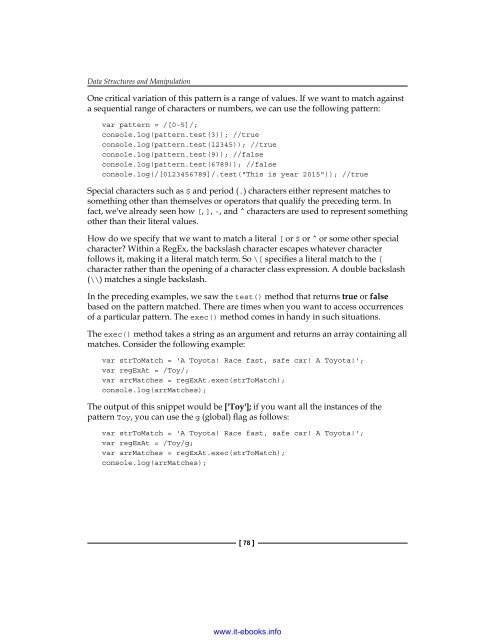Create successful ePaper yourself
Turn your PDF publications into a flip-book with our unique Google optimized e-Paper software.
Data Structures and Manipulation<br />
One critical variation of this pattern is a range of values. If we want to match against<br />
a sequential range of characters or numbers, we can use the following pattern:<br />
var pattern = /[0-5]/;<br />
console.log(pattern.test(3)); //true<br />
console.log(pattern.test(12345)); //true<br />
console.log(pattern.test(9)); //false<br />
console.log(pattern.test(6789)); //false<br />
console.log(/[0123456789]/.test("This is year 2015")); //true<br />
Special characters such as $ and period (.) characters either represent matches to<br />
something other than themselves or operators that qualify the preceding term. In<br />
fact, we've already seen how [, ], -, and ^ characters are used to represent something<br />
other than their literal values.<br />
How do we specify that we want to match a literal [ or $ or ^ or some other special<br />
character? Within a RegEx, the backslash character escapes whatever character<br />
follows it, making it a literal match term. So \[ specifies a literal match to the [<br />
character rather than the opening of a character class expression. A double backslash<br />
(\\) matches a single backslash.<br />
In the preceding examples, we saw the test() method that returns true or false<br />
based on the pattern matched. There are times when you want to access occurrences<br />
of a particular pattern. The exec() method comes in handy in such situations.<br />
The exec() method takes a string as an argument and returns an array containing all<br />
matches. Consider the following example:<br />
var strToMatch = 'A Toyota! Race fast, safe car! A Toyota!';<br />
var regExAt = /Toy/;<br />
var arrMatches = regExAt.exec(strToMatch);<br />
console.log(arrMatches);<br />
The output of this snippet would be ['Toy']; if you want all the instances of the<br />
pattern Toy, you can use the g (global) flag as follows:<br />
var strToMatch = 'A Toyota! Race fast, safe car! A Toyota!';<br />
var regExAt = /Toy/g;<br />
var arrMatches = regExAt.exec(strToMatch);<br />
console.log(arrMatches);<br />
[ 78 ]<br />
www.it-ebooks.info


